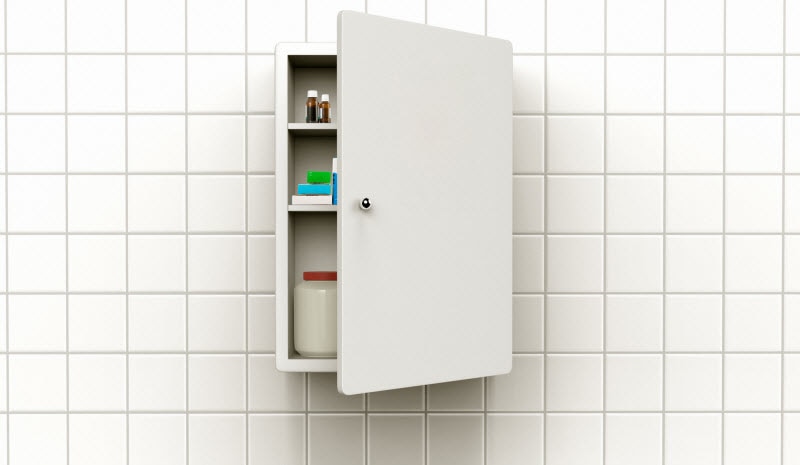If you’re in spring cleaning mode, don’t forget to include your medicine cabinet on the list of areas that deserves a refresh. Just like other dusty, often-neglected spaces in your home, these shelves not only can become speckled with dirt but cluttered with products that are no longer fit to use.
Besides clearing away gunk and debris, a medicine cabinet overhaul lets you get rid of old products, make room for new, and stay organized and on top of your supplement routine going forward. Follow these steps to make it happen.
Check expiration dates
Check expiration dates on both medications and supplements. “It should be obvious to pitch whatever is past its date, but you may have trouble locating a date on supplements if the company did not voluntarily add a date, as they are not required,” says Kelly Jones MS, RD, CSSD, LDN.
“Most vitamins and minerals will just lose potency over time versus becoming toxic, but you'll want to research specific herbs and botanicals, especially if the supplement contains multiple (ingredients) that may interact with one another,” she says.
You can also check with your healthcare provider to see what they think might be a good time frame for potency and safety based on the type of supplement.
Toss prescriptions more than a year old
For prescription medications, the rule of thumb is to discard anything over a year old. “If your supplements have been in a room temp or cooler environment that is also dark, most pill-based supplements are likely good over two years, though,” she says.*
Liquid supplements and oil-filled capsules (such as omega-3s) that have been opened should be disposed of sooner, since bacteria can thrive in liquid environments and oils can become rancid. Chewable tablets and gummy vitamins tend to spoil faster, as well, as they absorb more moisture, Jones adds.
Relocate from the bathroom
“After cleaning everything out, relocate most medications and supplements if they're in a bathroom cabinet. Due to the shower, there are pretty dramatic temperature and humidity changes that occur in the bathroom that can alter the potency of a medication or cause it to spoil more quickly,” Jones says.
Ideally, you’ll store your supplements and medications in a cool, dry place such as a kitchen cabinet (away from the stove, microwave and refrigerator) or bedroom shelf where there is less moisture.
Use your fridge
It’s OK to keep some supplements in the refrigerator—this prolongs shelf life. “Since oils oxidize, you want to keep omega-3s, flaxseed oils, evening primrose oil and any similar supplements in the refrigerator. This is best for more probiotic supplements as well,” she says. They will last longer!
Dispose of expired supplements properly
Like medications, some dietary supplements are classified as hazardous waste. “Don't throw medications or supplements in the trash or send them down your drain. The toxins and chemicals in these pharmaceuticals pollute water and land to pose a risk to the environment and therefore plants, wildlife and humans, too,” Jones says.
“These chemicals can also escape landfills and wind up in groundwater,” she adds. Another reason not to throw medications in the trash, especially prescriptions, is that they can be found and consumed by animals.
Medication bottles may also contain labels with personal identification information, which you do not want landing in the wrong hands.
Your state and local department of public works should have local guidelines and information about where to safely dispose of medications and supplements locally. You can also inquire. Look for medication disposal programs, or reach out to the EPA for more information.
“Alternatively, it's recommended to put the medication in a small plastic bag that you can seal, but also fill it with coffee grounds or a similar substance,” she adds.
Do a deep clean before returning items
Finally, remove everything from your cabinet and do a deep cleaning. “When you or a loved one is sick, it's easy to take liquid items in and out, quickly ignoring small and sticky spills,” she says.
Use soap and water or all-purpose cleaning solution to clean shelf and wall surfaces and remove any residue or bacteria that may be lurking in the cabinet.
Let the cabinet dry completely before replacing items. It can’t hurt to wipe down bottles and other items before positioning them, as well. Make sure everything that earns a place back on the shelf is useful and holds a place in your routine. If you no longer take something, make space by getting rid of it.
Place baking soda in the cabinet
Baking soda is great for removing humidity and odors, which can be especially helpful in certain climates or in spaces.
“If you live in a humid region and have the space, leave an open container of baking soda in the cabinet to absorb excess moisture,” she says. This can help keep things dry and prolong the shelf life and freshness of your supplement products.




